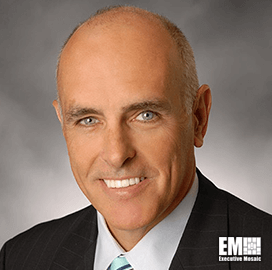
Paul Smith,
CEO,
RGS
Member Profile: Paul Smith, CEO of Rancher Government Solutions
Paul Smith assumed his role as CEO of Rancher Government Solutions in July, and as the company’s top executive, he works to advance its mission of providing secure open source technology to the U.S. government. He previously spent 17 years at Red Hat, and he currently serves as an advisor for Software AG Government Solutions, Mattermost and Mainsail.
In a recent interview with the Potomac Officers Club, Smith, a three-time Wash100 Award winner, shared his strategy for embracing change in the public sector, discussed his leadership values and offered his insights on challenges within the federal contracting landscape.
Read the full interview below:
What can you tell us about your background and how you’ve been able to adapt to the ever-changing challenges of the federal landscape over the course of your career?
With Red Hat and now Rancher Government Solutions, I have had a front-row seat to the philosophy, adoption and evolution of Open Source over the past 20 years. From a technology perspective, it is the premier method of innovation because it draws on the wisdom of crowds to solve problems. It invites new perspectives and ways of thinking, and those are the bedrocks of transformative innovation. From a leadership perspective, any good leader knows that being open, transparent and collaborative is the best way to manage change and to make an impact. When you operate that way – and your entire business is built on technology with the same principles at its core – you’re essentially conditioned to work hand-in-glove with your customer to solve hard problems. At Rancher, we’re working with the U.S. Government on difficult issues like security, zero trust and computing at the edge, and we understand their unique requirements. We also know that no single entity can do any of those things as well as a community with a purpose working together can. This is why we’re such big proponents of enterprise open source.
What do you believe are your core strengths as a leader and what lessons taught you the most about driving success?
Servant leadership is a major strength of mine. I start every day, every project, every interaction with the attitude that I work for the team, not the other way around. I want those in my charge to grow professionally and personally. The only way to do that is to have the right culture in place. Culture is built on mutual respect and trust, transparency and openness, modeling accountability to your teammates and creating an environment where respectful differences of opinion are not only heard, but invited. When people believe that their role has real impact, unbelievable energy and creativity is unleashed and you can do incredible things.
How would you describe your management style and core values towards building a winning culture?
On my first day at Rancher, I told the team that my virtual and physical doors were both open. I would be visible and up front, and I would lead from the front. But, as a servant leader, that also meant that our successes would be team accomplishments. When we have a win, we would all share the fame and when we fall short, we would all share the blame. To me, that’s the only way to operate and it’s the only way to lead if you want to accomplish something special.
If you were given free rein to enact changes in the federal landscape, what are the first three changes you would implement and why?
First, I’d make appropriations non-political and shutdowns illegal. Two, I’d make the compliance process more open, faster and cheaper without sacrificing security. The private sector operates this way and as a result, they benefit from innovation much faster and also deliver a better user experience. Third, I’d reward, promote and pay government employees based on merit and contribution, rather than time. Government jobs would become much more attractive, and agencies would be able to better compete with private-sector employers for talent.
With emerging technology influencing the federal government and industry more by the day, what are some of the challenges on the business side of innovation that aren’t always discussed as often as they should be?
Deciding not to do something can be as important as deciding to do something. You’re always prioritizing in business. You can’t do it all, nor should you. People often think about roadmaps as guides to get from one place to another – and they are – but they’re also clear outlines of what you’ll be doing, what you won’t and what you’ll prioritize along the way. At its core, innovation is about having faith that you can do something great and that you’ve chosen the right great thing to do. So, when you lead, you prioritize and you ask those around you to trust in your decisions. It’s a challenge to continually get that right, which we’re tackling all the time.

Category: Executive Profiles




